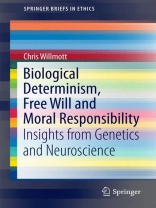This book examines the way in which new discoveries about genetic and neuroscience are influencing our understanding of human behaviour. As scientists unravel more about the ways in which genes and the environment work together to shape the development of our brains, their studies have importance beyond the narrow confines of the laboratory. This emerging knowledge has implications for our notions of morality and criminal responsibility. The extent to which “biological determinism” can be used as an explanation for our behaviour is of interest to philosophers reflecting on the free will versus determinism debate. It also has repercussions for the criminal justice system; in courtrooms around the world, defence lawyers are beginning to appeal to genetic and brain imaging data as grounds for finding their clients not guilty. Can a defendant’s genes or the structure of his brain be used as an excuse for his behaviour? Is criminality “hardwired”? Is it legitimate to claim “I couldn’t helpit, my genes made me do it”? This book appeals to anyone interested in the link between behaviour and genetics, the science and philosophy of moral responsibility and/or criminal law.
Зміст
Preface.- Chapter 1: Free will and determinism.- Chapter 2: Existing legislation on mental disorders and criminal cases.- Chapter 3: Biological Basis of Behaviour.- Chapter 4: Use of genetic and neuroscientific evidence in criminal cases: a brief history of “neurolaw”.- Chapter 5: Are we ready for an expanded use of neuroscientific evidence in the courtroom?.
Про автора
Chris Willmott is a Senior Lecturer in the Department of Molecular and Cell Biology at the University of Leicester, UK. Chris’ original research was on the molecular basis of antibiotic resistance, however for more than a decade his principal focus has been on bioethics. Chris has particular interests in bioethics education and in the media depiction of bioethical issues, including both factual and fictional representations. The present work emerges from a desire to distinguish the hope from the hype in regard to the role of genetics and neuroscience in the determination of our behaviour and thereafter our responsibility for any criminal activity. Chris was awarded a prestigious National Teaching Fellowship (Higher Education Academy, 2005) and in 2013 was runner-up in the National Bioscience Tutor of the Year (Society of Biology).












